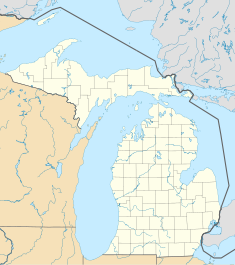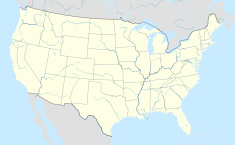East River Road Historic District
|
East River Road Historic District
|
|

Gothic Revival "Wedding Cake House" on East River Road
|
|
| Location | E. River Rd., Grosse Ile, Michigan |
|---|---|
| Coordinates | 42°7′33″N 83°8′30″W / 42.12583°N 83.14167°WCoordinates: 42°7′33″N 83°8′30″W / 42.12583°N 83.14167°W |
| Area | 18 acres (7.3 ha) |
| Architect | Gordon W. Lloyd |
| Architectural style | Gothic Revival, Swiss Chalet |
| NRHP Reference # | 74001003 |
| Significant dates | |
| Added to NRHP | August 13, 1974 |
| Designated MSHS | June 16, 1972 |
| Grosse Ile Depot, Canada Southern / Michigan Central Railroad Depot | |
|---|---|

Michigan Central Railroad Depot, 2010
|
|
| Built | 1904 |
| Designated | May 20, 1982 |
| U.S. Customs House | |
|---|---|

U.S. Customs House, 2010
|
|
| Built | 1871 |
| Designated | May 20, 1982 |
The East River Road Historic District is a historic district located along East River Road near the Grosse Ile Parkway in Grosse Ile, Michigan. The district includes eleven structures, including seven houses, two outbuildings, St. James Episcopal Church, and the Michigan Central Railroad depot. The district stretches from St. James Episcopal Church on the south to Littlecote on the north. The district was designated a Michigan State Historic Site in 1972 and listed on the National Register of Historic Places in 1973. The historically significant 1870s customs house was moved into the district in 1979.
The East River Road Historic District contains several homes built between 1840 and 1870, many of them by Gordon W. Lloyd. The houses in the district are all situated along East River Road facing the Detroit River with pleasant views and large yards. They are primarily Gothic Revival and Swiss Chalet in style, of both limestone and wood, and heavily ornamented with gingerbreading.
These homes were built for Detroit's affluent families, who sought clean and peaceful locations to spend the summer out of the unhealthy city atmosphere. Lloyd's Gothic Revival designs contributes to the ambience of the island, making it an attractive location for many of Detroit's most prominent 19th century families. The residents and architects who built these houses were strongly influenced by Andrew Jackson Downing and his publications Cottage Residences and The Architecture of Country Houses.
Among these houses are:
This house was constructed of native stone from the quarry on Grosse Ile in 1851 for Dallas Norvell, the son of Michigan U.S. Senator John Norvell. Dallas Norvell (July 28, 1825, Philadelphia, Pennsylvania – March 5, 1888, Amerstburg, Ontario) attended the University of Michigan and was later a gentleman farmer on Grosse Ile. He served as supervisor of Monguagon Township (1856, 1860-1866). He also served as Deputy Postmaster of Detroit. About 1870 he moved to Canada, as he felt the Island was becoming too crowded with "City Folks" from Detroit.
...
Wikipedia




